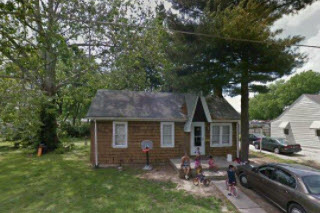
Realtors should be investors and investors should be realtors. That is an increasingly common mantra in the real estate business.
The arguments are these:
- Realtors are better at representing clients when they regularly do some buying and selling for their own account. They’re better at sniffing out opportunities, negotiating deals, finding contractors, and getting repairs done.
- Investors are better at buying and selling properties for their own account when they can gauge market values like a good realtor. And they can bring in unconventional terms, such as offering to buy out a client’s listed property, rather than waiting for the right buyer to come along.
Last week, I had opportunity to wear both hats—first to act as an investor, out of state; and then to spend a few days courting potential buyers of an MLS-listed home in Colorado.
Monday, I flew to St. Louis and checked into a hotel near the airport. Tuesday, I drove to a small town in southern Illinois, just across the Mississippi River. My plan was to visit 12 rental properties which the owner, in Colorado, wanted to sell. Their combined value, on paper, was around $800,000. He was willing to sell them to me for $700,000.
I had little interest in actually owning the properties. My strategy was to find a in landlord/investor (most likely in Illinois or St. Louis) to purchase them from me. I would then buy ‘em at $700,000, sell ‘em at $800,000, and pocket the difference.
This sort of dealing is called wholesaling, and it is common in real estate. Conceptually it is like “brokering” a deal between buyer and seller, which is what realtors do. But it involves briefly taking ownership before selling, maybe just for 30 minutes, and it does not require a broker’s license.
I advertised the properties in social media, with a colorful brochure and (if requested) an exhaustive value analysis based comps and rental income. The combined monthly rent was around $10,000. After expenses such as taxes, maintenance and insurance, it would produce an annual ROI of around 8 percent, which is pretty good.
—
My marketing generated plenty of interest in St. Louis. At least 20 investors requested the detailed analysis. But only one was interested enough to join me in touring the properties. For the others, I assume, crossing the Mississippi to invest was a bridge too far.
The first house we visited was occupied by a fortyish woman with two children, both away at a school. She managed to make it home from work at noon to show us around. The house was plagued by moisture and mold, she said. That was a big problem for her son, with severe asthma. Outside, we could see loose metal work around the chimney; possibly the source of moisture. Monthly rent was $891.
Next we visited the rented home of a single woman in her fifties. Total rent was $700. She was a Section 8 tenant; her rent was subsidized by HUD, and her share was $368. The house was built in the 1840’s, she believed. My investor asked if Abe Lincoln had slept there. The house lacked insulation and the interior was so cold that when temperatures dropped, she would routinely go to her daughter’s place to sleep. A winter storm was rolling in, and she was packing up to go.
Our next stop was duplex with both units vacant. One tenant was just then moving out. Why? A cousin had killed himself inside; she couldn’t bear the memory. Her rent had been $825. We heard water rushing in the basement. With the electricity shut off, a pipe had frozen and burst. The water was two feet deep.
We moved on to a dilapidated shack occupied by a woman with two children. The boy was immersed in a video game on a giant flat screen TV. Mom was away at work, managing a convenience store. Her dad swung by and recited an endless list of deficiencies: dangerous wiring, inoperable windows, recurring basement floods, and a gaping hole in the garage ceiling where an electrician had fallen through to the floor. Monthly rent was $750.
Our last stop was a ginger-bread-looking house (see above), quaint from a distance but a shambles up close, encased in dried out cedar shingles that, I’m guessing, had never been treated to resist moisture. The roof was worse and inside, mold was so pervasive that the underlying sheetrock was literally falling apart, everywhere.
The tenant was a man in his sixties, holding a beloved dachshund in his arms. I asked why he stayed in the house. He said he couldn’t pay any more than the current rent of $500. But he did have a nice Ford F-150 in the driveway.
The next day, Wednesday, I’d planned to visit what remained of the 12 properties. The winter weather was wicked, with overnight rain and sleet frozen like cement onto the roads and the MLK Bridge. I holed up in the hotel and viewed no more properties. My potential investor/buyer had bailed out anyway. The deal was dead, as far as I was concerned. I flew home, arriving at DIA after midnight in below zero temperatures.
—
My realtor hat fit much more comfortably last week. Thursday, I listed a nicely renovated six-bedroom home in Castle Rock, at price higher than where I’d proposed to purchase that 12-property package in Illinois. I staged three-hour open house events Saturday and Sunday. Traffic was great. As of Sunday night, no offers were received.
Should investors be realtors? Probably, yes. Partly to avoid paying broker commissions on their own buys and sells. But modern real estate practice is complicated. There are many ways to mess up a deal. Anyone who doesn’t keep up—through continuing education and the like—is a danger to the unwitting client who thinks all realtors are the same.
Should realtors be real estate investors? In my experience, yes. Particularly if they are advising clients in how to invest. Their education will benefit their clients. What lessons did I learn while wearing my investor hat last week? Not sure, except these:
- Appreciate what you have, particularly if you live in a decent, well-functioning house in a nice area.
- Don’t force an investment. If it doesn’t work, it doesn’t work. If you’re invested in it, in terms of time and effort, cut your losses.
- Maybe stay west of the Mississippi.

